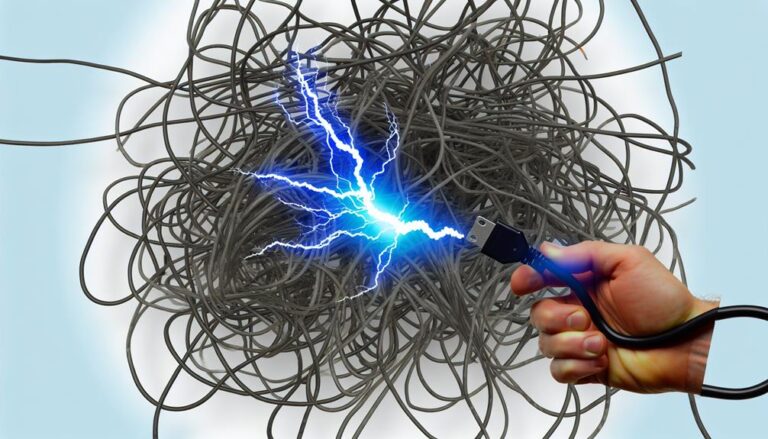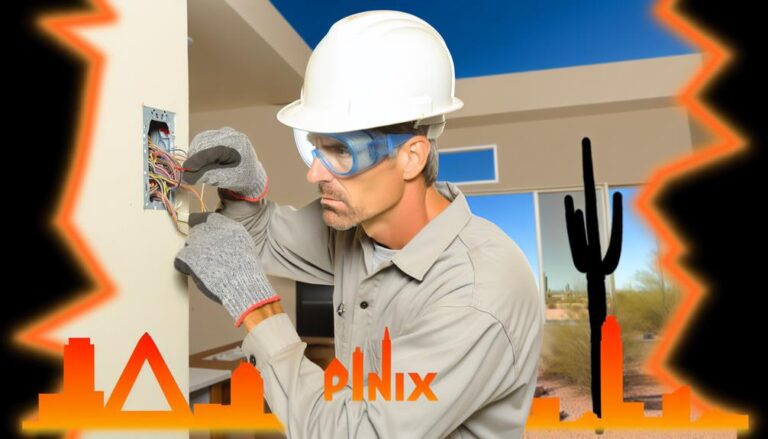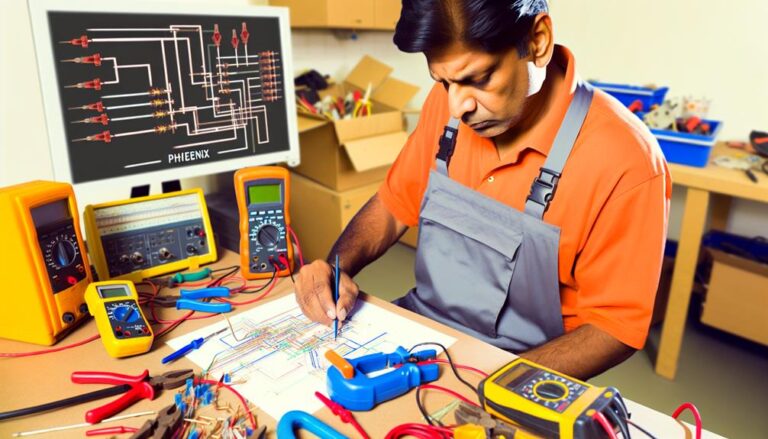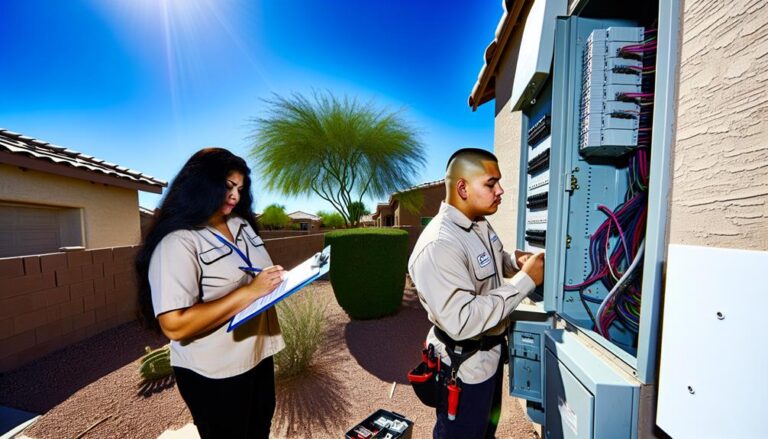Electricians’ Role in Phoenix’s Renewable Energy Transition
Did you know that Phoenix is one of the fastest-growing cities in the United States for solar energy installations? With an increase of over 2,000% in installed solar capacity in the past decade, it’s clear that renewable energy is becoming a significant part of the city’s transition towards a more sustainable future.
But have you ever wondered about the role electricians play in this transition? Well, you’re about to find out. From installing solar panels to upgrading electrical systems and integrating renewable energy technologies, electricians are at the forefront of this renewable energy revolution in Phoenix.
But their role goes beyond just installation – they also conduct energy audits and ensure safety and compliance. So, if you’re curious to learn more about how electricians are shaping Phoenix’s renewable energy landscape, keep reading. There’s much more to discover.
Key Takeaways
- Electricians play a crucial role in assessing the site suitability for solar panel installation and determining the required number and size of panels based on electrical load.
- They are responsible for upgrading electrical systems by assessing the current infrastructure, increasing capacity, installing new circuit breakers and wiring, and upgrading grounding and bonding systems.
- Electricians ensure the proper integration of renewable energy technologies with existing electrical systems, adhering to industry standards and codes for safety and reliability.
- They conduct energy audits to assess the efficiency and performance of electrical equipment and systems, identifying areas of high energy consumption and recommending upgrades or replacements for energy efficiency.
Installing Solar Panels
When installing solar panels, electricians play a crucial role in ensuring the proper installation and connection of these renewable energy systems. The installation process begins with assessing the site’s suitability for solar panel installation. Electricians evaluate factors such as the angle and orientation of the roof, shading from surrounding structures or trees, and the available space for panel placement. They also consider the electrical load of the property to determine the required number and size of solar panels.
Once the site assessment is complete, electricians proceed with the installation process. This involves mounting the panels securely on the roof or ground, ensuring their alignment for maximum exposure to sunlight. Electricians then connect the panels to the electrical system of the property, using specialized equipment and techniques to ensure a safe and efficient connection. They also install the necessary wiring, inverters, and meters to convert the solar energy into usable electricity.
Throughout the installation, electricians adhere to local building codes and safety regulations to guarantee the integrity and reliability of the system.
Upgrading Electrical Systems
To further enhance the integration of solar panels, electricians are instrumental in upgrading electrical systems to accommodate the increased capacity and optimize the performance of these renewable energy installations. Upgrading electrical systems involves a range of tasks, from assessing the current infrastructure to implementing necessary modifications or additions. This process ensures that the electrical system can handle the additional load and effectively distribute the electricity generated by the solar panels.
One key aspect of upgrading electrical systems is increasing the capacity of the main electrical panel. This involves upgrading the panel to a higher amperage rating, allowing it to handle the increased electrical demand. Additionally, electricians may need to install new circuit breakers and wiring to support the additional solar panels.
Another important consideration is optimizing the performance of the solar panels through the installation of monitoring systems. These systems provide real-time data on the energy production and consumption, allowing homeowners or businesses to track their energy usage and make informed decisions for efficiency improvements.
Furthermore, electricians may need to upgrade the grounding and bonding systems to ensure safety and compliance with electrical codes. Grounding systems protect against electrical faults and provide a path for electrical current to safely discharge into the earth.
Overall, electricians play a critical role in upgrading electrical systems to maximize the benefits of solar panels and ensure a smooth transition to renewable energy sources.
| Upgrading Electrical Systems |
|---|
| Increase capacity of main electrical panel |
| Install new circuit breakers and wiring |
| Install monitoring systems for performance optimization |
| Upgrade grounding and bonding systems |
| Ensure safety and compliance with electrical codes |
Integrating Renewable Energy Technologies
Electricians play a crucial role in the seamless integration of renewable energy technologies within Phoenix’s electrical systems. As the city continues its transition towards a more sustainable future, the integration of renewable energy sources such as solar panels and wind turbines has become increasingly important. It’s the responsibility of electricians to ensure that these technologies are properly connected and integrated into the existing electrical infrastructure.
One of the key tasks for electricians is to assess the compatibility of renewable energy technologies with the existing electrical systems. This involves evaluating the capacity of the electrical grid to accommodate the additional power generated by renewable sources. Electricians must also consider factors such as voltage requirements, power quality, and grid stability to ensure a smooth integration.
In addition, electricians are responsible for installing and maintaining the necessary equipment and infrastructure for renewable energy technologies. This includes wiring, inverters, battery storage systems, and monitoring devices. They must ensure that all components are properly connected and functioning correctly to optimize the performance and efficiency of the renewable energy systems.
Furthermore, electricians play a vital role in ensuring the safety and reliability of the integrated renewable energy technologies. They must adhere to industry standards and codes to minimize the risk of electrical hazards and ensure compliance with regulatory requirements. Regular inspections and maintenance of the systems are also necessary to prevent any potential issues and ensure the long-term reliability of the renewable energy technologies.
Conducting Energy Audits
As part of their role in the integration of renewable energy technologies, electricians are responsible for conducting energy audits to assess the energy usage and efficiency of buildings and electrical systems in Phoenix. These audits provide valuable insights into the current energy consumption patterns and identify areas where improvements can be made to increase energy efficiency and reduce waste.
Here are three key aspects that electricians focus on during energy audits:
- Equipment Assessment: Electricians thoroughly examine the electrical equipment and systems within a building to evaluate their efficiency and performance. This includes analyzing lighting fixtures, HVAC systems, appliances, and other energy-consuming devices. By identifying outdated or inefficient equipment, electricians can recommend upgrades or replacements to improve energy efficiency.
- Energy Consumption Analysis: Electricians collect and analyze data on energy consumption patterns within a building. This involves studying utility bills, monitoring energy usage through smart meters, and using specialized tools to measure energy consumption in different areas. By understanding the energy usage patterns, electricians can identify areas of high energy consumption and develop strategies to optimize energy usage.
- Building Envelope Evaluation: Electricians assess the building envelope, including insulation, windows, doors, and air sealing. A well-insulated and properly sealed building envelope helps prevent energy loss and improves energy efficiency. Electricians may recommend insulation upgrades or weatherization techniques to enhance the building’s energy performance.
Ensuring Safety and Compliance
During energy audits, electricians play a crucial role in ensuring the safety and compliance of buildings and electrical systems in Phoenix. Safety is of utmost importance when it comes to renewable energy systems, as they involve complex components and intricate wiring. Electricians are responsible for identifying any potential hazards or risks that may arise from the installation or operation of these systems.
One key aspect of ensuring safety and compliance is verifying that the electrical system meets all applicable codes and standards. Electricians thoroughly inspect the system, checking for proper grounding, adequate wiring, and correct installation of all components. They also ensure that the system is properly labeled, with clear indications of voltage levels and potential hazards.
In addition to code compliance, electricians also pay close attention to safety measures such as the use of appropriate personal protective equipment (PPE) and the implementation of proper lockout-tagout procedures. They ensure that all workers involved in the installation or maintenance of renewable energy systems are trained in safety protocols and follow them diligently.
© 2025 By Electrician Phoenix






